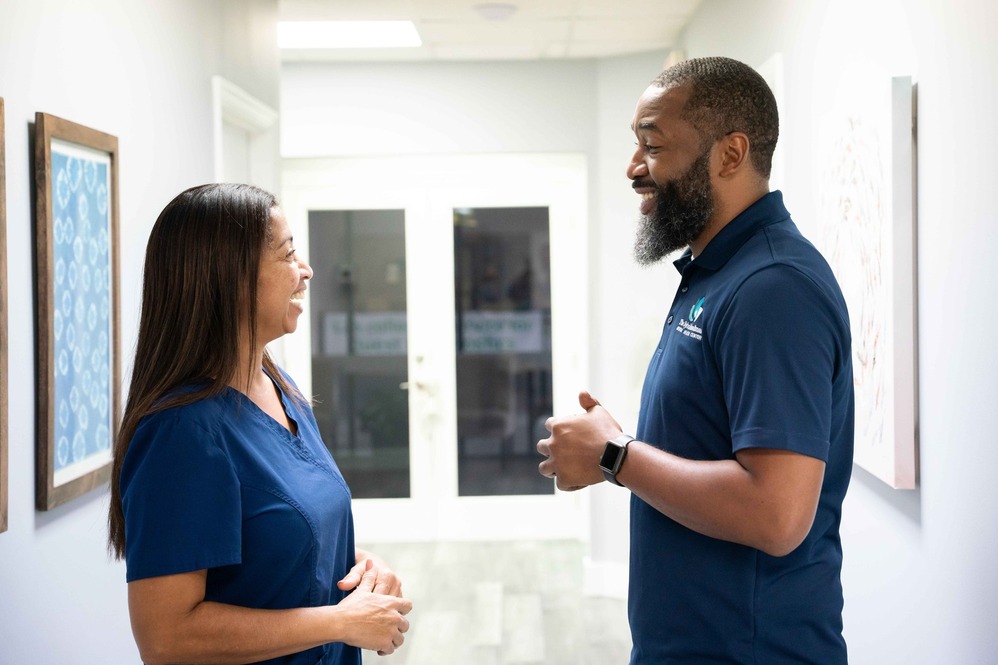The Sylvia Brafman Mental Health Center offers accessible, high-quality, integrated care for a wide variety of mental health conditions and co-occurring disorders. How much does mental health treatment cost in Georgia? This page will provide details on mental health therapy costs, treatment financing options, and more. For immediate assistance, call 877-958-9212.

Cost of Mental Health Therapy and Treatment Programs Near Atlanta, Georgia
Georgia Mental Health Statistics
In Georgia, 33.9% of adults report symptoms of depression or anxiety, while nationwide, 8.3% of adults have reported a major depressive episode. Unfortunately, 28.3% of those adults suffering from a mental health disorder do not receive the necessary treatment. Annually, one in twenty adults in Georgia suffer from severe psychiatric experiences, and hundreds of thousands have a mental health disorder.
While Georgia stands out for its agricultural contributions, the overwhelming stress faced by farmers has caused the occupation to have the highest rate of death caused by stress-related and psychiatric conditions. Reportedly, 49% of farmers reported depression symptoms, and 61% of those first-generation farmers had suicidal ideation.

What is a Mental Health Disorder?
Mental health disorders generally affect how one thinks, feels, and behaves. Your cognitive function, emotional well-being, and overall psychological health are impacted by these conditions. These conditions often cause significant distress and disrupt your daily life. The severity and duration of mental health disorders will vary for every individual and depend on multiple factors, including whether or not you have a support system.
Mental health disorders often arise from a complex interplay of various factors. Biological influences such as genetics and brain chemistry can predispose individuals to certain conditions. Psychological factors like trauma or chronic stress further contribute to the development of these disorders. Additionally, environmental elements—including family dynamics and social pressures—can significantly impact wellness and mental health, either exacerbating existing issues or encouraging new ones. Together, these factors shape the unique mental health challenges each individual faces.
What are the Different Types of Mental Health Disorders?
Mental health disorders range from a variety of conditions that affect your thoughts, emotions, and behavior. Common mood disorders include depression and bipolar disorder. Other categories include psychiatric conditions like schizophrenia, eating disorders, and substance abuse. Below is a partial list with more details on common mental health disorders.

Different Types of Treatment Programs for Mental Health Treatment
Various mental health resources and treatment program options exist, including inpatient and outpatient care. While the list below highlights some common options, it is not a full list. The Sylvia Brafman Mental Health Center patient advocates can help you find the appropriate treatment for your needs. Contact us today.

How to Find a Mental Health Treatment Center Near Atlanta, Georgia
Finding the right mental health treatment in Georgia can be easy with a clear, structured approach. As mental health advocates, we’re committed to making the process as smooth and seamless as possible. You’re welcome to call 877-958-9212 or visit The Sylvia Brafman Mental Health Treatment Center at 7710 NW 71st Ct, Tamarac, FL 33321.
In the meantime, follow the steps below to help you navigate the process of locating mental health treatment options near you:
- Understand Your Needs: Identify the mental health challenges you or your loved one are experiencing, such as depression, anxiety, substance abuse, or trauma, for example.
- Research Treatment Options: Use your preferred search engine and type “mental health treatment center in Atlanta, Georgia.” You can also use your exact city or “near me” to identify centers close to you.
- Verify Insurance Coverage: Contact your insurance provider to review your policy details and confirm the healthcare costs the policy covers. Ask for a list of in-network providers to reduce increased out-of-pocket medical expenses.
- Read Reviews and Testimonials: Lookup feedback from former patients to gain insight into the quality of care and the environment of the treatment center.
- Contact the Program: Contact the centers you’re interested in to learn more about their treatment methods related to your symptoms, staff qualifications, and admissions process.
- Consider Specialized Programs: Depending on your needs, you may need a specialized program, like dual-diagnosis care or services tailored for specific groups such as military veterans or the LGBTQ+ community.
- Explore Financial Options: Ask about treatment financing options, inpatient vs. outpatient costs, and any general medical treatment expenses.
- Visit the Facility: Schedule a visit to meet staff, tour the environment, and ensure it’s the right fit for you.

At The Sylvia Brafman Mental Health Treatment Center in Fort Lauderdale, Florida, our team of dedicated professionals is ready to guide you. We offer IOP and a variety of mental health treatment programs, each uniquely designed to meet your needs. We’re also able to offer accommodation at affordable rates if you’re traveling from out of state. So don’t wait—reach out to us today! Either give us a call or fill out the form below to request a callback.
"*" indicates required fields

How Much Does Mental Health Treatment Cost in Atlanta, Georgia?
The average cost for mental health treatment varies based on factors such as the type of care, your health insurance policy, and whether your treatment is online or in-person. Individual therapy typically costs between $100 and $200 per hour, while group therapy will likely be less. An intensive program will incur much higher expenses.
Does insurance cover the cost of treatment? Many facilities and treatment centers, including The Sylvia Brafman Mental Health Center, accept insurance plans. Insurance can significantly reduce your out-of-pocket healthcare costs. Many also offer affordable treatment options, payment plans, and sliding-scale fees to help make mental health care more accessible.
If you have insurance, it’s important to research centers and understand your insurance policy details. The Sylvia Brafman Mental Health Center patient advocates can call your provider, review your coverage, and confirm your policy details, including info related to your health insurance deductible.
How Much Does an Inpatient Residential Program for Mental Health Treatment Cost in Georgia?
Residential mental health treatment and therapy programs generally cost between $500 and $2,000 per day on average. The cost of mental health services can vary based on factors such as the facility, the level of care offered, and the location. For a typical 30-day program, costs usually range from $15,000 to $60,000.
This may include room fees, meals, individual and group therapy sessions, and other specialized treatments. Many centers also offer recreational activities to encourage mental health support and emotional well-being. For a more accurate estimate of inpatient residential rehabilitation program fees as they relate to your treatment needs, contact The Sylvia Brafman Mental Health Center.

How Much Does an Intensive Outpatient Program for Mental Health Treatment Cost in Georgia?
An Intensive Outpatient Program (IOP) will be much less than residential care. However, without insurance or treatment financing options, IOPs average between $250 and $350 per day, bringing a month-long program to around $9,000. These programs generally include a weekly schedule of individual and group psychotherapy techniques, medication management, and more.
The cost of treatment at an intensive outpatient facility depends on factors such as the duration of the program, the facility’s location, and any additional medical treatment expenses. The wide range in costs also directly depends on whether you have insurance or are uninsured, but IOPs are typically lower in cost because 24/7 care isn’t required.
How Much Does a Partial Hospitalization Program for Mental Health Treatment Cost in Georgia?
Partial Hospitalization Programs (PHPs) in private mental health rehab facilities cost an average of $300 to $600 a day. These rehab costs will vary widely according to the treatment duration and whether or not you have insurance coverage for treatment.
To determine the most suitable level of care for your specific needs, contact the patient advocates at Sylvia Brafman. We’re often asked, “How much does mental health treatment cost in Georgia?” We can provide a complimentary assessment that evaluates your medical history and current mental health symptoms to determine the best program for your unique circumstances. Our financial counselors can follow up this information with an accurate estimate of rehabilitation program fees so you can make informed decisions and budget accordingly.
Does Georgia Health Insurance Cover the Cost of Mental Health Treatment?
Yes, mental health treatment costs in Georgia are covered by health insurance. Individual and family plans offered through the Health Insurance Marketplace must include mental health services as essential benefits under the Affordable Care Act (ACA). These plans often cover a variety of mental health therapy costs, such as anxiety treatment for panic disorder.
Despite these services being available, the State of Georgia ranks forty-eighth in access to mental health resources, care, and insurance. Our patient advocates are here to help you determine the cost of mental health services as they relate to your treatment needs.
Which Health Insurance Providers Cover Mental Health Disorder Treatment in Georgia?
In Georgia, major health insurance providers like Blue Cross Blue Shield, Magellan, the New York State Health Insurance Program (NYSHIP), and UnitedHealthcare offer coverage for the cost of therapy and treatment. These plans often include behavioral therapy, anxiety treatment, and mental health support programs.
Coverage details vary by provider, and some plans place financial limits on medical treatment expenses like rehabilitation program fees and other related healthcare costs. The Sylvia Brafman Mental Health Center is dedicated to mental health advocacy and support. Allow us to assist you in reviewing the cost of mental health treatment in Georgia.

How Much Does Depression Treatment Cost with Georgia Health Insurance Plan Coverage?
The average cost of treating depression symptoms varies based on your health insurance plan details, whether your treatment is online or in-person, and inpatient vs. outpatient costs. An individual therapy session, for example, ranges between $100 and $200. Insurance covers a significant portion, with average copays landing between $20 and $60.
Insurance coverage is so diverse that it’s important to contact your insurer or a healthcare provider like Sylvia Brafman to confirm details like drug rehab prices, addiction treatment costs, and other mental health-related expenses. Contact our patient advocates at The Sylvia Brafman Mental Health Treatment Center, and we will verify your insurance coverage for depression treatment.
How Much Does Depression Treatment Cost Without Georgia Health Insurance Support?
The cost of treating depression symptoms without insurance depends on many factors, including whether your treatment is online or in-person, inpatient versus outpatient costs, and how long you need treatment. In Georgia, the average therapy session is $150. You’ll want to consider additional expenses, such as antidepressants and medication management services.
To reduce out-of-pocket medical treatment expenses, many healthcare professionals offer financial aid plans or a sliding scale fee based on income and household size to help make wellness and mental health resources affordable and accessible for Georgians. The Sylvia Brafman Mental Health Center can provide information on affordable treatment options.
How Much Does Mental Health Therapy and Counseling Treatment Cost in Georgia?
Mental health treatment costs in Atlanta, GA, for therapy and counseling, depend on multiple factors, including whether the treatment is online or in a facility and the location of the treatment center. In Georgia, individual therapy averages between $100 to $200 per hour, while a monthly structured therapy program will be much higher.
Many therapists and community programs offer treatment financing options, including payment plans and sliding-scale fees, to make healthcare more accessible. Understanding healthcare costs and researching your options is crucial. The Sylvia Brafman Mental Health Center patient advocates can help determine the cost of mental health therapy and counseling related to your treatment needs.



